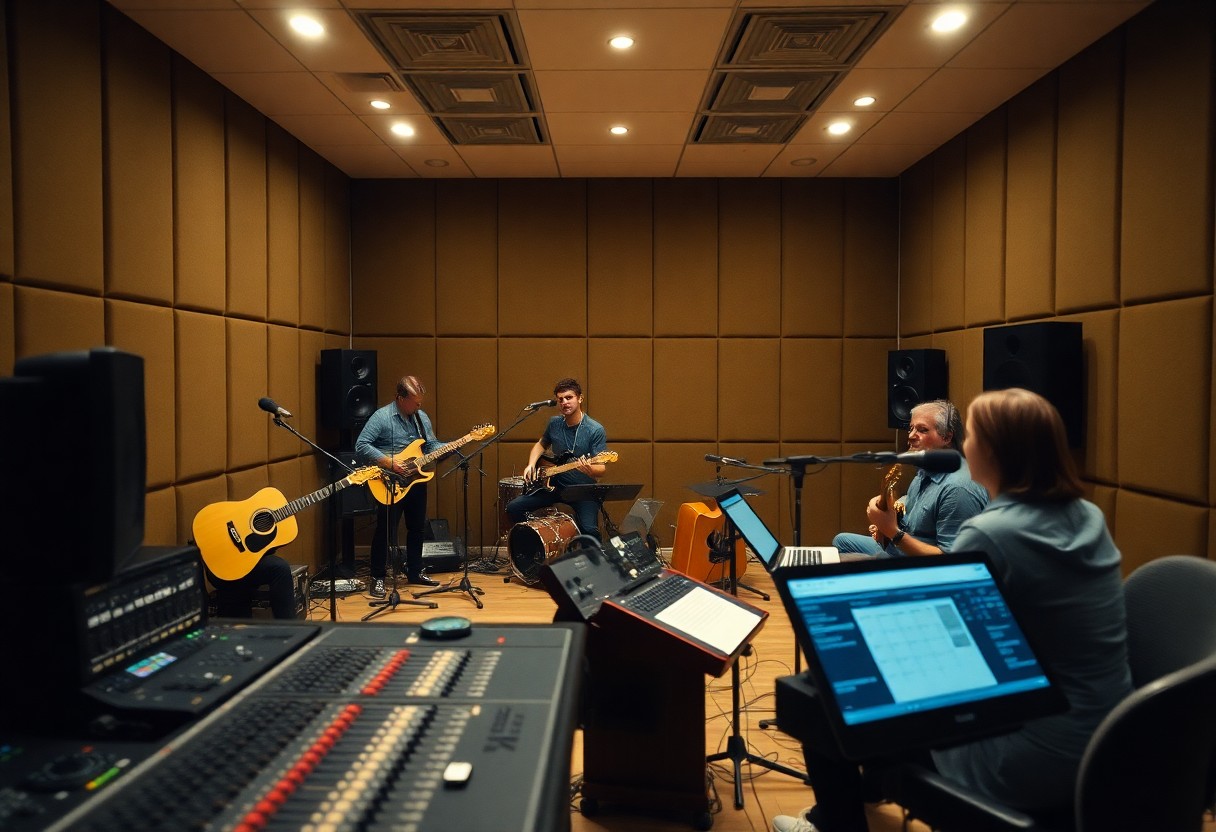There’s a world of information waiting for you when it comes to navigating the recording studio, mastering music production, and honing your band skills. Whether you’re a seasoned musician or just starting out, understanding the right keywords can empower your creative process. By focusing on necessary tips and tricks, you’ll enhance your sound, optimize production efficiency, and ultimately elevate your musical journey. Let’s look into the key concepts that will guide you towards success in your recording endeavors.
Key Takeaways:
- Choosing the right recording studio that aligns with the band’s vision can significantly enhance the music production process.
- Effective communication with the sound engineer increases the likelihood of capturing the desired sound quality and production value.
- Having a well-prepared set of songs and arrangements before entering the studio can streamline recording sessions and optimize time.
- Experimenting with different recording techniques and equipment can yield unique sounds that elevate the final product.
- Collaborating with experienced producers can provide valuable insights and guidance throughout the music production process.
- Regular practice and rehearsals prior to recording sessions can lead to better performances and a smoother studio experience.
- Utilizing social media and digital platforms for promotion can help bands gain exposure and reach their target audience effectively after releasing music.
Essential Recording Studio Equipment
While setting up your recording studio, it’s important to have the right equipment to achieve professional-quality sound. From microphones to audio interfaces, each piece plays a vital role in capturing and producing your music. Understanding what you need ensures that you’re well-prepared to create and refine your sound, no matter where you are in your musical journey.
Basic Hardware Requirements
Beside the obvious items like microphones and monitors, ensure you have a reliable audio interface, headphones, and cables. These components form the foundation of your studio. Investing in quality hardware not only enhances sound clarity but also improves your overall recording experience.
Software and Digital Audio Workstations (DAWs)
Audio production relies heavily on your choice of software, commonly referred to as Digital Audio Workstations (DAWs). These programs allow you to record, edit, and mix your music efficiently.
For instance, popular DAWs like Ableton Live and Pro Tools provide advanced features for multi-track recording and audio editing, making it easier for you to bring your vision to life. Additionally, some DAWs offer built-in virtual instruments and effects that can enhance your tracks significantly. Investing time in learning your chosen DAW can lead to a smoother production process and better final mixes, helping your music stand out.
Studio Setup and Acoustics
If you want to create a professional sound in your recordings, setting up your studio with proper acoustics is crucial. The design of your space can significantly affect the quality of your music production. Take the time to consider the shape, materials, and furniture in your studio to ensure that sound waves interact harmoniously, allowing you to capture and mix tracks effectively.
Room Treatment Fundamentals
For optimal sound quality, you should focus on absorbing, diffusing, and reflecting sound within your studio. Implementing panels, bass traps, and strategic furniture placement can help control unwanted echoes and background noise, creating a more accurate listening environment. Don’t overlook the impact of soft furnishings, as they play a significant role in dampening sound reflections and enhancing your overall sound experience.
Monitor Placement and Calibration
By placing and calibrating your studio monitors correctly, you enable more accurate sound reproduction. The positioning should usually be at ear level and form an equilateral triangle with your listening position for the best stereo imaging.
Due to the interaction between your monitors and the room’s acoustics, minor adjustments in placement can lead to significant changes in sound clarity. It’s important to keep your monitors at least two feet away from walls to reduce bass buildup and sound coloration. Regularly calibrating your monitors will enhance your mixing accuracy, helping you to create balanced tracks that translate well across various playback systems. Take the time to test your settings and make adjustments, as these steps can greatly affect the final output of your recordings.
Pre-Production Planning
For a successful recording, proper pre-production planning is necessary. This phase lays the foundation for your project, helping you determine song structures, arrangements, and logistics. By investing time in pre-production, you can ensure a smoother recording session and effectively convey your artistic vision. You’ll be able to identify any potential issues before they arise, making the entire process more efficient and enjoyable.
Song Arrangement Preparation
Among the key elements to focus on during pre-production is song arrangement preparation. You’ll want to analyze each song, dissecting its structure to determine how best to present your ideas. Working on arrangement well in advance allows you to experiment with different parts, harmonies, and sections, ultimately enhancing the final product and ensuring a coherent sound that captivates your audience.
Recording Session Scheduling
PreProduction is the time to finalize your recording session schedule. You need to coordinate with your band members and studio engineers to ensure everyone is on the same page regarding timelines and availability. Effective scheduling prevents conflicts and allows for a well-organized session that allows you to maximize your creative output.
It’s important to set a realistic timeline for your recording sessions, as this helps you stay on track and keep the momentum going. Consider allocating adequate time for setup, breaks, and revisions to ensure your team’s creativity isn’t stifled. Last-minute changes can lead to stress and impacts your session’s flow, so communicate openly with your team while being prepared to adapt if necessary. Have backup plans in place and keep your schedule flexible to cater to any unexpected challenges that might arise during the process. By doing this, you give your music the best chance to shine through during recording.
Recording Techniques
All great recordings begin with effective recording techniques that can elevate your music production. Whether you’re tracking vocals, instruments, or entire bands, mastering these techniques will ensure that your sound is polished and professional. From microphone selection to signal chain optimization, taking the time to refine these aspects will profoundly impact the quality of your recordings.
Microphone Selection and Placement
Recording the right sound starts with choosing the appropriate microphone for each source. Different microphones capture frequencies differently and can greatly affect the overall tone of your music. Experiment with various microphone types and placements to find what best suits your sound, ensuring clarity and depth in your recordings.
Signal Chain Optimization
Among the components of your studio setup, the signal chain plays a pivotal role in achieving high-quality recordings. This involves the meticulous selection and arrangement of gear in your recording path—from microphones and preamps to effects and digital audio converters. You will want to ensure that each element is compatible to avoid introducing unwanted noise or distortion.
In addition to choosing the right equipment, optimizing your signal chain requires careful consideration of gain staging. Properly managing levels throughout your signal path prevents clipping and ensures dynamic range is preserved, resulting in a cleaner mix. Make sure to check each component’s settings and keep a consistent level of fidelity to enhance your recordings significantly. This attention to detail will pave the way for a more polished and professional sound in your final mix.
Band Performance Tips
Once again, standing out as a band during performances requires preparation and practice. Here are some key tips to elevate your band’s presence and impact:
- Engage your audience with strong stage presence.
- Set clear musical goals for each performance.
- Rehearse setlists to ensure tight performances.
- Communicate effectively with your band mates.
Thou aim for synergy to create unforgettable experiences.
Creating the Right Atmosphere
For your audience to connect deeply with your performance, setting the right atmosphere is imperative. Adjust lighting, background visuals, and even the stage layout to enhance the overall experience. Additionally, think about the ambiance of the venue and choose elements that resonate with your band’s style and message.
Managing Studio Time Efficiently
Before entering the studio, plan your session meticulously to maximize productivity. This means organizing your material, prioritizing tracks, and ensuring all band members are well-prepared.
Managing studio time efficiently can make or break your recording process. You should establish a schedule that outlines each segment of the session, promoting focus and productivity. Make sure each band member arrives with their parts thoroughly rehearsed to reduce unnecessary downtime. It’s imperative to minimize distractions during recording, while also being flexible to accommodate creative spurts. This approach boosts both your efficiency and the quality of your music production, ensuring that you craft a polished final product within your allocated time.
Post-Production Essentials
Unlike the initial recording phase, post-production focuses on refining and enhancing your music to achieve a polished final product. This stage involves critical processes such as mixing and mastering, where you can shape the sound of your tracks to ensure they resonate with your audience. Understanding the crucials of post-production will significantly elevate your music’s quality and help you stand out in a competitive industry.
Mixing Best Practices
Before exploring into mixing, ensure you have a clear vision of the sound you want to achieve. Take the time to organize your tracks, balance levels, and apply EQ strategically. Utilizing panning effectively can help create a sense of space while using compression will add punch and clarity to your mix.
Mastering Considerations
One important aspect of post-production is mastering, the final stage that prepares your music for distribution. This process involves optimizing the overall sound and ensuring consistency across all tracks in your project.
Further, mastering is where you enhance the overall loudness of your music, making it competitive with commercial tracks. This includes careful adjustments to the frequency balance to prevent any masking effects, which could rob your mix of clarity. Additionally, pay attention to dynamic range during mastering; too much compression can lead to a loss of musicality. A well-mastered track will translate better across various playback systems, ensuring your audience experiences the full richness and detail of your music.
To wrap up
As a reminder, establishing your recording studio and enhancing your music production skills can significantly elevate your band’s sound. Focus on refining your recording techniques, experimenting with different equipment, and collaborating effectively with your fellow musicians. By applying these band tips consistently, you can create high-quality tracks that stand out in today’s competitive music scene. Embrace the learning process, and watch as your artistic vision transforms into a polished reality.
FAQ
Q: How can I find a good recording studio for my band?
A: To find a suitable recording studio, start by researching local studios online. Check their website for audio samples and client testimonials. Visit them in person if possible to assess the space and equipment. Consider the studio’s atmosphere, proximity, and pricing. Asking for recommendations from other musicians or local bands can also lead you to reputable options.
Q: What are the vital steps in the music production process?
A: Music production typically involves several key steps: 1) Pre-production, where you refine your songs and arrange them; 2) Tracking, where you record individual instruments and vocals; 3) Editing, where mistakes are corrected, and performances are polished; 4) Mixing, which balances the levels of each track and adds effects; and 5) Mastering, the final step to optimize sound quality and prepare the track for distribution.
Q: What tips can I follow to help my band improve its sound while recording?
A: To enhance your band’s sound during recording, focus on proper rehearsing and arrangement before entering the studio. Aim for clarity in your playing and vocal delivery. Experiment with microphone placement and sound levels to find the best results. Working with a skilled sound engineer can also help refine your recordings. Lastly, ensure everyone is comfortable and focused to achieve the best performances.
Q: How can I effectively promote my band’s music after recording?
A: After recording, promote your music through social media platforms, music streaming services, and your band’s website. Create engaging content, such as behind-the-scenes videos or teaser clips, to build excitement. Consider reaching out to music blogs, local radio stations, and podcasts for features. Collaborating with other artists or bands can also expand your audience and increase your exposure.
Q: What gear is important for a home recording setup?
A: A basic home recording setup should include the following vital gear: a quality audio interface to connect instruments and microphones to your computer, a versatile digital audio workstation (DAW) software for editing and mixing, good studio monitors or headphones for accurate sound monitoring, and a decent microphone for vocals and instruments. Optional items like MIDI controllers, acoustic treatment, and various plugins can further enhance your recordings.









